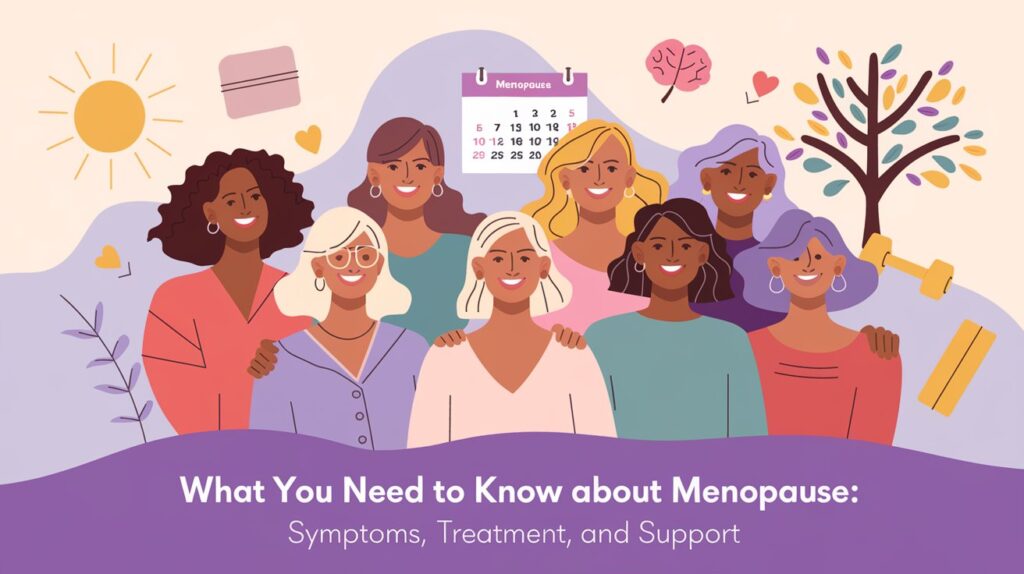
Menopause is a normal biological transition that signifies the cessation of a woman’s menstrual cycles. While it is a normal biological process, the transition can come with various physical and emotional challenges. Understanding menopause, its symptoms, available treatments, and the support options can help women manage this stage of life with confidence. This blog will provide you with a comprehensive overview of what you need to know about menopause, from the signs to the treatment options and ways to cope.
What is Menopause?
Menopause is diagnosed after a woman experiences 12 months in a row without a menstrual period. It usually occurs between the ages of 45 and 55, but it can happen earlier or later. The process marks the end of a woman’s menstrual cycle and the ability to conceive naturally. This phase is caused by a natural decline in reproductive hormones, particularly estrogen and progesterone, which play vital roles in the menstrual cycle and overall reproductive health.
Symptoms of Menopause
Menopause is often accompanied by a variety of symptoms, some of which can be disruptive to a woman’s daily life. These symptoms occur because of the hormonal changes taking place in the body. While the intensity and duration of symptoms vary from woman to woman, here are some of the most common signs of menopause:
- Hot flashes are a hallmark symptom of menopause, affecting many women during this phase. They involve sudden feelings of intense warmth, often accompanied by sweating and redness. Hot flashes can occur during the day or night and may interfere with sleep.
- Night Sweats Similar to hot flashes, night sweats involve intense sweating that occurs during sleep. These can disturb rest and affect a woman’s quality of sleep, leading to fatigue and irritability.
- Irregular Periods Before menopause officially begins, many women experience irregular periods. Periods may become heavier or lighter, and the length of time between periods can vary. This phase is known as perimenopause.
- Mood Changes Hormonal fluctuations during menopause can cause mood swings, irritability, anxiety, and even depression. Many women also report feeling more emotional than usual during this time.
- Vaginal Dryness As estrogen levels decline, vaginal dryness and discomfort during intercourse may occur. This can lead to a decrease in libido and may also cause urinary problems like increased frequency and urgency.
- Sleep Disturbances Hormonal changes can interfere with sleep, leading to insomnia or waking up in the middle of the night. Hot flashes and night sweats often exacerbate these issues.
- Memory and Concentration Issues Many women report experiencing “brain fog” during menopause, which includes memory lapses and trouble concentrating.
- Decreased Bone Density The reduction in estrogen levels can lead to a decrease in bone density, increasing the risk of osteoporosis and fractures.
- Weight Gain and Changes in Metabolism Some women may notice changes in their metabolism, which can result in weight gain, particularly around the abdominal area.
Treatment Options for Menopause
While menopause is a natural process, the symptoms can sometimes be severe and interfere with daily life. Fortunately, several treatment options are available to manage symptoms effectively. Here are some common approaches:
- Hormone Replacement Therapy (HRT) One of the most common treatments for menopause symptoms is hormone replacement therapy (HRT). HRT involves supplementing the body with estrogen or a combination of estrogen and progesterone to alleviate symptoms like hot flashes and vaginal dryness. It can also help protect against osteoporosis. However, HRT is not suitable for everyone, and there are risks, so it’s important to consult with a healthcare provider before starting this treatment.
- Non-Hormonal Medications For women who cannot or choose not to use HRT, several non-hormonal medications may help manage symptoms. These include antidepressants, anticonvulsants, and blood pressure medications, which can help with mood swings, hot flashes, and night sweats.
- Lifestyle Changes Simple lifestyle changes can have a significant impact on menopause symptoms. These include:
- Exercise: Regular physical activity can help manage weight gain, improve mood, and boost overall health.
- Diet: Eating a balanced diet rich in calcium, vitamin D, and fiber is important for bone health and overall well-being. Reducing the consumption of triggers such as caffeine, alcohol, and spicy foods can help alleviate the occurrence of hot flashes.
- Stress Management: Practices like yoga, meditation, and deep breathing exercises can help manage stress and reduce mood swings.
- Vaginal Moisturizers and Lubricants For women experiencing vaginal dryness, using vaginal moisturizers and lubricants can provide relief and make intercourse more comfortable. Over-the-counter options are available, and a healthcare provider can recommend suitable products.
- Bone Health Supplements Since estrogen levels drop during menopause, women may experience a decrease in bone density. Calcium and vitamin D supplements can help maintain bone health and reduce the risk of osteoporosis.
Support During Menopause
While menopause can be a challenging time, having the right support can make a significant difference. Women may find it helpful to talk to others who are going through similar experiences or to seek professional counseling. Support groups, whether in-person or online, can provide emotional support and helpful tips for managing symptoms. Additionally, a healthcare provider can offer guidance on symptom management and recommend therapies or treatments tailored to an individual’s needs.
Coping with Emotional and Mental Health Challenges
The hormonal changes during menopause can affect mental and emotional well-being. Women may experience anxiety, depression, or mood swings, which are often exacerbated by physical symptoms. Seeking professional help from a therapist or counselor can help address these challenges. Cognitive behavioral therapy (CBT) and other therapeutic techniques can be highly effective in managing menopause-related mental health concerns.
When to See a Doctor
If menopause symptoms are causing significant disruption to your daily life, it’s important to consult with a healthcare provider. A doctor can perform tests to confirm that symptoms are due to menopause and not another underlying health condition. They can also recommend personalized treatment options to manage symptoms effectively.
Conclusion: Embracing the Menopause Journey
Menopause is a natural part of life, and while it may come with challenges, it’s important to approach this stage with knowledge and support. With the right treatments and lifestyle changes, women can manage symptoms and continue to live vibrant, healthy lives. At Vijay Super Speciality Hospital, we understand the importance of women’s health during this transitional phase. Our expert team is here to support you through menopause with comprehensive care and guidance.
